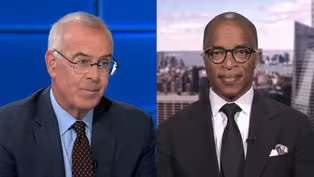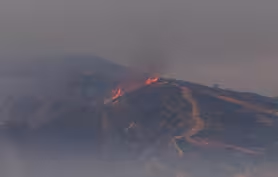
Scientists face ecological, economic hurdles to save delta
Clip: 8/8/2025 | 8m 24sVideo has Closed Captions
Scientists face ecological and economic hurdles to save Mississippi River Delta
The iconic Mississippi River Delta is of enormous importance to the country, especially near the Gulf Coast. It's an economic engine and a key wildlife habitat. But it's shrinking considerably due to a variety of factors, including engineering done decades ago. Science Correspondent Miles O'Brien looks at those problems and efforts to prevent further loss.
Problems playing video? | Closed Captioning Feedback
Problems playing video? | Closed Captioning Feedback
Major corporate funding for the PBS News Hour is provided by BDO, BNSF, Consumer Cellular, American Cruise Lines, and Raymond James. Funding for the PBS NewsHour Weekend is provided by...

Scientists face ecological, economic hurdles to save delta
Clip: 8/8/2025 | 8m 24sVideo has Closed Captions
The iconic Mississippi River Delta is of enormous importance to the country, especially near the Gulf Coast. It's an economic engine and a key wildlife habitat. But it's shrinking considerably due to a variety of factors, including engineering done decades ago. Science Correspondent Miles O'Brien looks at those problems and efforts to prevent further loss.
Problems playing video? | Closed Captioning Feedback
How to Watch PBS News Hour
PBS News Hour is available to stream on pbs.org and the free PBS App, available on iPhone, Apple TV, Android TV, Android smartphones, Amazon Fire TV, Amazon Fire Tablet, Roku, Samsung Smart TV, and Vizio.
Providing Support for PBS.org
Learn Moreabout PBS online sponsorshipGEOFF BENNETT: The iconic Mississippi River Delta is of enormous importance to the country, especially near the Gulf Coast.
More than two million people live near that part of the Delta.
It's an economic engine home to tourism, fisheries, and a shipping gateway to North America.
And it's also a key wildlife habitat.
Nearly 40 percent of the coastal wetlands in the contiguous U.S. is found in the Delta in Louisiana.
But it's shrinking considerably due to a number of factors, including engineering done some decades ago.
Our science correspondent, Miles O'Brien, looks at those problems and efforts to prevent further loss.
CAROL WILSON, Associate Professor, Louisiana State University: All right, ladies, let's get ready for our coring.
MILES O'BRIEN: In the place where the Mississippi River drains into the Gulf... CAROL WILSON: We don't actually know what we're going to get here.
MILES O'BRIEN: ... scientists are waist-deep... CAROL WILSON: Here we go.
MILES O'BRIEN: ... in a desperate effort to stop the largest wetland system in the U.S. from vanishing.
CAROL WILSON: All right, do us the honors.
Great job.
WOMAN: Twenty-five, 27.
Gray.
MILES O'BRIEN: Sedimentologist Carol Wilson is an associate professor at Louisiana State University.
CAROL WILSON: I have been doing it for 25 years of my life now, more than half of my life.
I have been down here playing in the mud.
MILES O'BRIEN: She and her team are studying the mud in the place they call the Bird's Foot, so named because of the way the Mississippi River spreads out into three canals at its mouth.
By the time the river wends its way here to its marshy mouth, where soil, river and sea mix in a swampy gumbo, the Mississippi is depleted of much of its famous mud.
CAROL WILSON: It's really strangled the Delta.
Like, this natural wetland, they're starved of sediment that they used to receive.
So this area since the 1950s has been deteriorating.
MILES O'BRIEN: River deltas grow and shrink naturally over time, but the mouth of the Mississippi is disappearing at an unnaturally rapid pace thanks to the way humans have engineered the river to answer their bidding.
0 SAMUEL BENTLEY, Louisiana State University: The engineering of the river over the last couple of centuries has had several unintended consequences.
MILES O'BRIEN: Marine geologist Sam Bentley is a professor at LSU.
The trouble begins in a big tributary, the Missouri River.
In the mid-20th century, the U.S. Army Corps of Engineers built six major dams there to control floods, ensure navigation and generate electricity.
SAMUEL BENTLEY: The construction of dams for water control in the Upper Missouri Basin cut off sediment supply to the lower river in the first half of the 20th century.
That essentially lowered the amount of sediment that's carried by the river by at least 50 percent.
MILES O'BRIEN: The Corps has built and maintains about 3,500 miles of levees and flood walls along the Mississippi from Cape Girardeau to the Bird's Foot.
The structures are there to prevent floods and keep commerce flowing.
SAMUEL BENTLEY: Those levees and those hardening structures have prevented sediment to go from the river to the deltaic wetlands, which require sediment to sustain themselves.
MILES O'BRIEN: The oil and gas industry is also to blame locally and globally.
Sea level is rising more than three-quarters-of-an-inch a year here due to the climate crisis, and all the fossil fuel extraction that occurs in the region leads to the dredging of deep channels and the construction of pipelines.
It all hastens the sinking of the Mississippi River Delta, so-called subsidence.
On average, the Delta loses about a football field of wetlands every 100 minutes.
SAMUEL BENTLEY: The combination of these factors has driven the entirety of the Delta, not just the Bird's Foot, but much of the Mississippi River Delta, into a catastrophic state of decline.
MILES O'BRIEN: Carol Wilson is part of a multidisciplinary team led by Bentley that is studying this catastrophe on multiple fronts.
The work is funded, ironically, by the $20 billion settlement from BP to atone for its Deepwater Horizon oil spill in 2010.
CAROL WILSON: What we are out here to study is the natural dynamics, but also is it keeping pace or not with that relative sea level rise?
So think about, land surface is going down.
Can the marsh fill in that gap, in that space?
MILES O'BRIEN: Nearby, her colleagues coastal hydrologist Matt Hiatt and river scientist Kory Konsoer are gathering data to better understand how the river delivers sediment from the channel to the marsh.
They use an acoustic instrument that measures the speed of small particles suspended in the water.
MATT HIATT, Louisiana State University: We can make a prediction of how much sediment is actually moving through the river channel and into those wetland environments through small secondary channels that connect to the main channels.
MILES O'BRIEN: When the water is too shallow to use the acoustic device, they release photodegradable dye and measure its spread with a drone.
KORY KONSOER, Louisiana State University: What's really important about that is it not only gives us the water velocity through the wetlands, but it shows us how that water and sediment interact with the vegetation within the wetland.
MILES O'BRIEN: The challenge is to find ways to divert Mississippi mud into the marshland without affecting navigation on the river.
JEFF CORBINO, U.S. Army Corps of Engineers: The idea that the Mississippi River could be unleashed and magically nourish all these areas, it sounds very romantic.
It just doesn't work that way in practice.
MILES O'BRIEN: Biologist Jeff Corbino is an environmental resource specialist for the Army Corps of Engineers.
He helps manage a complex dredging campaign to keep the river channel 50 feet deep from Baton Rouge to the mouth year-round.
JEFF CORBINO: My other nature is always going to win.
We are in no way controlling the Mississippi River.
We react to it.
We are playing the cards that we are dealt with.
MILES O'BRIEN: Right now, the Corps is dealing with orders to save as much of the dredge sediment as it can to nourish and sustain healthier wetlands.
Scientists on Sam Bentley's team are also hoping their data will inform efforts to design and build diversions to reroute and spread Mississippi sediment throughout the dying wetlands.
SAMUEL BENTLEY: They're controversial in many ways, but the science supporting diversions as a tool for coastal restoration has been very solid for many decades.
MILES O'BRIEN: So why would a diversion project be controversial at all?
Let's take a look at one of them to try to understand why.
This is New Orleans here.
Here's the Bird's Foot, and the river, which runs between the two of them.
In 2023, construction began on the $2.9 billion Mid-Barataria Sediment Diversion.
The idea, when the Mississippi had enough water to spare, water would be diverted into Barataria Bay right about here to make these wetlands more healthy.
But the problem is down here is a big oyster area, and the salinity of the water for oysters is very critical.
This would have a great impact on those businesses.
The oyster industry led the charge of opposition.
Governor Jeff Landry withdrew state support, and the project is now dead.
CAROL WILSON: In order for our wetlands to have a chance, they have got to have some kind of supply of sediment to them.
If a diversion is not the exact mechanism, then let's come up with another plan.
MILES O'BRIEN: Over the past century, Louisiana has lost a land mass roughly the size of Delaware.
Without a viable plan to restore balance between nature and navigation, between ecology and economy, the next 100 years could erase what's left.
For the "PBS News Hour," I'm Miles O'Brien in Venice, Louisiana.
GEOFF BENNETT: You can see more of Miles' reporting on the Mississippi and the threats it faces from his recent special livestream.
You can find that at PBS.org/NewsHour.
Brooks and Capehart on Israel's plans to control Gaza
Video has Closed Captions
Clip: 8/8/2025 | 10m 3s | Brooks and Capehart on Israel's plans to exert more control over Gaza (10m 3s)
Gaza takeover won't end Hamas influence, Mideast expert says
Video has Closed Captions
Clip: 8/8/2025 | 5m 41s | Netanyahu's Gaza takeover won't end Hamas influence in the region, Mideast analyst says (5m 41s)
How Trump's census plan could reshape congressional maps
Video has Closed Captions
Clip: 8/8/2025 | 4m 48s | How Trump's census plan could reshape congressional maps (4m 48s)
Israel decides to take Gaza City, sparking condemnation
Video has Closed Captions
Clip: 8/8/2025 | 4m | Israel's government decides to take Gaza City, sparking condemnation and protests (4m)
News Wrap: Thousands flee fire in mountains near LA
Video has Closed Captions
Clip: 8/8/2025 | 5m 56s | News Wrap: Thousands forced to flee Canyon Fire in mountains near LA (5m 56s)
Recent natural disasters highlight Trump's changes to FEMA
Video has Closed Captions
Clip: 8/8/2025 | 6m 31s | Federal response to recent disasters reveals impact of Trump's changes to FEMA (6m 31s)
Trump to meet with Putin for talks on ending Ukraine war
Video has Closed Captions
Clip: 8/8/2025 | 6m 38s | Trump will meet with Putin in Alaska for talks on ending Russia's war in Ukraine (6m 38s)
Providing Support for PBS.org
Learn Moreabout PBS online sponsorshipSupport for PBS provided by:
Major corporate funding for the PBS News Hour is provided by BDO, BNSF, Consumer Cellular, American Cruise Lines, and Raymond James. Funding for the PBS NewsHour Weekend is provided by...


















